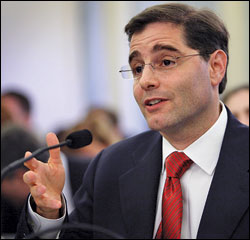
FCC Chairman Julius Genachowski
Today, the FCC has announced plans to vote on rules to govern the use of "white spaces" in spectrum between TV stations, a decision that provides an enormous expansion of unlicensed airwaves that could open the door to "supercharged" WiFi networks. In other words, the regulatory framework would approve the use of WiFi-enabled devices that operate in long-range spectrum normally set aside for the television channels. Realistically, the decision could soon allow single WiFi access points to cover entire university or corporate campuses.
The unused bands of "white space" spectrum were accomplished by the countrywide conversion from analog television signals to purely digital signals. The NY Times notes that digital transmissions use a smaller slice of spectrum than analog counterparts, and the result is that more free "white space" opened up around the country for each analog broadcast signal that was removed. In short, the FCC seeks to put this white space to use in a digital world where WiFi technology seems to be the strongest connectivity platform for mobile devices. "The last time we did this, no one knew what would happen," said FCC Chairman Julius Genachowski. "But the result - wireless computer networking and other consumer applications - has transformed the economy."
For years, wireless equipment manufacturers have been awaiting the ability to engineer devices that operate in unlicensed white spaces. The signals in this broad spectrum easy penetrate walls and can travel for miles, just like broadcast television. In fact, the signals would particularly benefit highly urban metropolitan areas with multiple-story buildings and high rises, as signals would be able to vertically fill gaps between floor stories where coverage and throughput were never stable.
The FCC's decision would enable stronger, faster networks that allow for smart electric grids, remote health monitoring, and "a huge range of applications that we cannot yet predict," said Dan Reed, corporate vice president for technology policy and strategy at Microsoft. DigitalTrends reports that white space technologies should be able to deliver wireless bandwidth in the range of 15 to 20Mbps, putting the spectrum efficiency on par with many wired broadband technologies.
According to industry strategists, however, there is no single set of whitespace frequencies that can be generally implemented throughout the entire country. Network installers in various regions and municipalities would need to determine available white space frequencies that are unused in any given area. Analysts suggest that whitespace-enabled devices sold in retail channels could automatically configure their frequencies using GPS coordinates. In conjunction, location-aware software programs or device firmware could to look up the device's geographical location in a central database and configure usable frequencies to match available whitespace within the respective location. After all, the big push in the mobile CE industry seems to be location-awareness, and marketing consultants are constantly creating new avenues of revenue growth to lure consumers into pushing this emergent mobile technology forward.
Nevertheless, the FCC expects to pass a vote on unused white spaces as early as Thursday, September 23, 2010. While issues of interference and other conflicts are currently being discussed by FCC officials, Genachowski says the commission "[is] confident that the benefits of moving forward are so significant that we should act now." Let's just hope the commission does the same with Net Neutrality.





